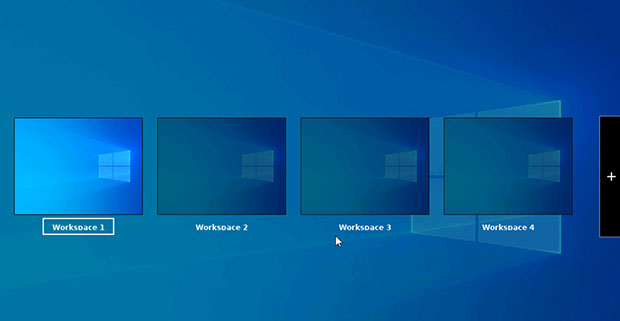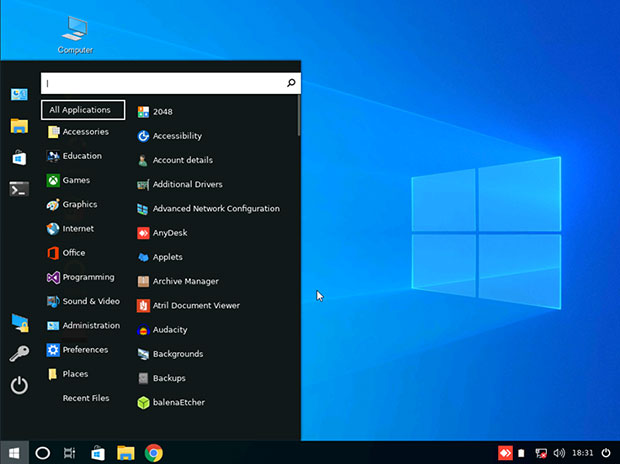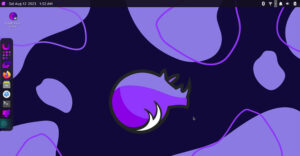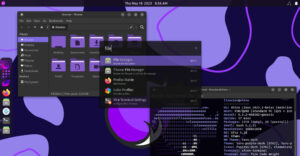Linuxfx 10 could provide businesses and consumers with a Windows 7-like experience that puts users on a smooth downhill path to Linux adoption.
Distributions that tweak styles and desktop environment settings to create a Windows-clone type of familiar experience are now numerous, but they often fail to entice reluctant users to stay the course and remain with Linux.
Linuxfx 10 is the closest pathway I have seen to transitioning from real Windows 7 or 10 to Linux with a convincing Windows overlay. It also can be an ideal computing solution without the Windows decor by changing the theme and other system settings with the included tools.
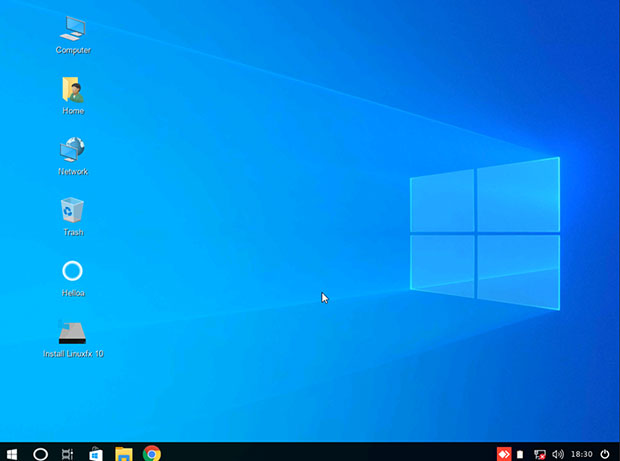
Either way, Linuxfx 10 offers a collection of specialized tools that make this unusual Linux desktop a very functional and easy-to-use option over other Linux distributions.
The May 7 release is the first new upgrade since version 9.0 arrived on May 11, 2018.
Unwrapping Linuxfx
Linuxfx 10 is a Brazilian Linux distribution founded by Rafael Rachid. It is based on Ubuntu 20.04 LTS. That means you have five years of system upgrades.
Rachid designed this distro as a platform for some of his company’s specialized software, but you can set these applications aside and focus on the Windows theming as you get acquainted with the Linux desktop applications.
The developers included some of the best features in the look and feel of Windows while providing a rock-solid Ubuntu Linux base. The advantage for Linux newcomers is the ability to maintain compatibility with the original Microsoft Windows applications natively and transparently.
The Windows theme and the tweaked user interface in some of the Linux applications make the combination work. For instance, some of the embedded applications are tooled to look like Windows 10 programs.
The developers redesigned the LibreOffice/Openoffice productivity suite with an MS Office theme and tabs. Even the booting process has a Windows 10 appeal, thanks to a Windows logo and system integrity check that replaces the Linux or OEM logo.
Design Matters
The developers applied a bit of a magician’s sleight of hand. Some documentation describes the desktop environment as being based on the KDE desktop. Perhaps earlier versions were to a greater extent, but the version 10.1 release clearly resembles the Cinnamon desktop.
That makes sense. The Cinnamon desktop more closely mimics the look and feel of Windows in terms of the bottom taskbar, menu button, and system tray placement and functionality.
This Linuxfx version has the Cinnamon desklets and the even better panel bar applets. This combination, I think, is far superior to the assortment of awkward desktop gadgets available in the KDE Plasma desktop.
Wrap the Windows theme around it all, as the developers did, and you have a very familiar desktop view while transitioning from Windows to Linux. The Cinnamon desktop is an ideal way to facilitate the migration of users from Windows.
Another key feature that gives this distro a unique design flavor is the B00merang Project. It is the engine that enables the developers to let you turn Linuxfx’s Linux desktop appearance into Windows, macOS, Ubuntu, or other OSes. This point-and-click process lets you choose from dozens of themes and icons that include operating systems with old and new looks.
What’s Included
Linuxfx 10 includes the developer’s video management system, called “Sentinela.” Also included is the Helloa wizard for installing the Sentinela platform. This platform contains computer vision systems to control access of people, vehicles, object detection and integrated data analysis.
The Helloa assistant is in the development phase. The developer has plans for it to do more than act as an installer script for Sentinela. His goal is to have Helloa assist users in carrying out the most diverse tasks of the operating system.
You can use Sentinela for access control (think facial recognition and automatic number plate recognition), object detection, gender, age, and mood detection.
Like I said earlier, these are specialized platforms that you can simply ignore — but depending on your business needs and personal intrigue, you might find this and other included applications very unique and useful.
Other features in Linuxfx include a new personal assistant and a WX theme for desktop and system applications. These and other included Windows programs showcase the crossover functionality in software compatibility between the Microsoft platform and the world of Linux.
The software written for Windows (.exe and .msi file formats) is easily accessible through a WINE port. The WINE Windows environment is available for most Linux distributions.
Linuxfx has it preinstalled and mostly preconfigured, so it works more seamlessly — as if the user actually were inside a Windows 10 operating system.
Easily launch all supported Windows programs or games by right-clicking on the app icon and opening it with WINE.
Other Goodies Inside
A really cool benefit of using Linuxfx is that it can be a great home theater platform, thanks to the preinstalled Kodi media player. Once you log in with Kodi, you can add all your media files from local or remote storage locations.
Other featured embedded applications include Google Chrome and Firefox Internet browsers, Microsoft Teams/Skype for video conferencing, Teamviewer/Anydesk for remote assistance, and VLC (in addition to Kodi) for multimedia.
More Linux apps preinstalled include GIMP, VLC, and Inkscape for image editing, Simple Screen Recorder for capturing desktop images, and balenaEtcher for burning optical media.
If you want more applications, you have Ubuntu Software Center in place of the Windows store. Thanks to Ubuntu’s own universal snap package management system, you can also install any version of apps using the snap package.
Bottom Line
Linuxfx is a great OS to run on older computers. It does not need very advanced hardware. A dual-core rig with a minimum of 2 GB of RAM is enough to run the system without lags or sluggishness.
However, you will experience far superior performance if your hardware exceeds the minimum requirement. The sweet spot is at least 4 GB RAM and 16 GB of free disk space.
Installation is a no-brainer as well. It is a fairly straightforward process that takes around 5 minutes.
Suggest a Review
Is there a Linux software application or distro you’d like to suggest for review? Something you love or would like to get to know?
Email your ideas to me, and I’ll consider them for a future column.
And use the Reader Comments feature below to provide your input!



